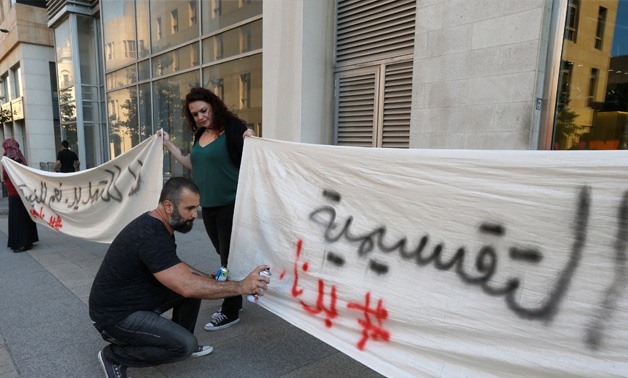
A man sprays paint on a banner during a demonstration against an extension of the parliament's term, in Beirut - REUTERS/Mohamed Azakir
BEIRUT- 11 May 2017 - Lebanon is on the brink of crisis again with its politicians at odds over an election law at the heart of the nation's sectarian system, threatening to leave the country without a parliament for the first time.
Parliament's term expires on June 20 and without a compromise Lebanon faces what one minister has called the most serious political crisis since the end of the 1975-90 civil war.
Some analysts believe the dangers of a parliamentary vacuum - including the risk this would topple the government - will force a compromise deal, though there is no sign of one yet.
A short extension of parliament's term beyond June 20 now looks inevitable to allow more time for a deal, though a so-called "technical extension" of a few months will also require a political agreement. Leaders have ruled out a longer extension on concerns of a popular backlash that could cause unrest.
"This is the most dangerous crisis the country has been through since the Taif agreement," Finance Minister Ali Hassan Khalil told Reuters, referring to the 1989 peace deal that ended the civil war. "It is the first time since even before Taif that we are close to a (legislative) vacuum," he said.
However, the prospect of a return to civil war appears remote. Lebanese leaders remain committed to containing sectarian tensions exacerbated by six years of war in Syria.
The bigger risk is state paralysis as the government tries to revive an economy saddled by massive public debt and to cope with the strain of 1.5 million refugees from neighboring Syria.
MARONITE GRIEVANCES
Parliament's 128 seats are split equally between Christians and Muslims under the terms of the Taif agreement, which diluted the Christians' power by reducing their seats in parliament and curbing the powers of the Maronite president.
The agreement also strengthened the powers of the prime minister - a post reserved for a Sunni Muslim. The post of parliament speaker is reserved for a Shi'ite Muslim.
Lebanon's once-dominant Maronite Christians are at the heart of the dispute. Maronite leaders say the law used to hold the last election gives Muslims too much say over which Christian MPs get elected.
The main Christian party, the Free Patriotic Movement (FPM) founded by President Michel Aoun, wants a law that redraws constituencies so that more of the Christian seats are decided exclusively by Christian voters.
Aoun said a new electoral law was one of his priorities when he took office last October in a deal that ended a 2-1/2-year vacuum in the presidency and saw Sunni politician Saad al-Hariri become prime minister.
Lebanon last held a parliamentary election in 2009. Elections have been postponed twice since then, with MPs opting to extend their own term rather than tackle fundamental disagreements over how the polls should be conducted.
Critics say the Christian FPM's logic is too sectarian: the existing system has helped to forge political alliances that cut across sectarian lines.
"Our position on the electoral law is not sectarian, but we are trying to restore the greatest number of rights to their owners," Aoun said in a written statement from the presidency.
Proposals tabled by FPM leader Gebran Bassil, the foreign minister and Aoun's son-in-law, have been rejected by most other parties including his allies in the powerful, armed Shi'ite movement Hezbollah.
JUMBLATT WANTS "PACKAGE DEAL"
Hezbollah leader Sayyed Hassan Nasrallah noted in a speech this month that Lebanese Christians and Druze were more worried about the law than Sunnis and Shi'ites - Lebanon's dominant sects since the civil war. Nasrallah said to some Lebanese, it was a matter of "life or death" and a deal must be reached.
Druze leader Walid Jumblatt said if there was no deal, the election should be held under the existing law to avoid a vacuum. Lawmakers were so far unable to find a way out of "a vicious circle", he told Reuters.
In their efforts to strike a deal, politicians have broadened the talks to include the possible establishment of a senate envisaged by the Taif deal. At the time of Taif, it was agreed that the head of the senate should be a Druze. But that understanding has also become a point of contention.
"We prefer that we stick to this agreement, and we want our other partners to understand us," Jumblatt said. "It's better to agree on the leadership of the senate - a package deal."
Nabil Boumonsef, a commentator with an-Nahar newspaper, said he believed the risk of failure would force a compromise.
"All the parties know the meaning of this possibility, and fear of its consequences will push them to a settlement at the last moment," he said.


Comments
Leave a Comment